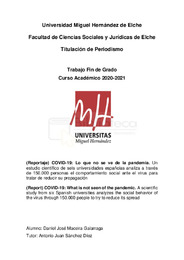Por favor, use este identificador para citar o enlazar este ítem:
https://hdl.handle.net/11000/26548Registro completo de metadatos
| Campo DC | Valor | Lengua/Idioma |
|---|---|---|
| dc.contributor.advisor | Sánchez Díez, Antonio Juan | - |
| dc.contributor.author | Maceira Galarraga, Daniel José | - |
| dc.contributor.other | Departamentos de la UMH::Ciencias Sociales y Humanas | es_ES |
| dc.date.accessioned | 2022-04-08T07:03:53Z | - |
| dc.date.available | 2022-04-08T07:03:53Z | - |
| dc.date.created | 2021-09-03 | - |
| dc.identifier.uri | http://hdl.handle.net/11000/26548 | - |
| dc.description.abstract | En todo el mundo estamos viviendo la pandemia del COVID-19 y hemos visto cómo a lo largo de estos años en lo que el virus esta viviendo con nosotros, está afectando en gran nivel a la sociedad. Las medidas que cada país toma, para intentar frenar el avance del virus, en base a las predicciones que realizan los expertos encargados, son bien estudiadas para evitar el mayor caos posible en la sociedad. También hay muchos expertos que trabajan de forma independiente al Estado o en centros privados que realizan sus propias investigaciones y avanzan predicciones del COVID-19. Muchas de estás predicciones aparecen en los medios de comunicación social, y en ocasiones hacen contraste con otras predicciones sobre el número de contagios o fallecidos. Por lo tanto, las publicaciones sobre las predicciones, tanto en medios de comunicación social tradicionales como la televisión, la radio o los digitales, está afectando la salud mental de las personas. Ahora bien, a pesar del continuo aumento de fallecidos y de casos positivos, no hay que dejar de lado las enfermedades que afectan la salud mental como consecuencia de las medidas que aplica cada comunidad autónoma en base a las predicciones que hacen los centros privados o públicos. Estás enfermedades están afectando a gran cantidad de la población española, por lo tanto, la salud mental está siendo alterada desde una simple predicción. Es por ello que es importante hacer varias mediciones en base a qué grupo de edad es el más afectado, cuáles son las enfermedades más comunes o simplemente en que momento es cuando más personas padecen estos trastornos. | es_ES |
| dc.description.abstract | All over the world we are living the COVID-19 pandemic and we have seen how over those two years in what the virus is living with us, it is affecting society on a great level. The measures that each country takes, to try to slow the advance of the virus, based on the predictions made by the experts in charge, are well studied to avoid as much chaos as possible in society. There are also many experts who work independently of the state or in private centers that conduct their own research and make predictions of COVID-19. Many of these predictions appear in the main media, and sometimes contrast with other predictions about the number of contagions or deaths from the pandemic. Therefore, publications on predictions, both in traditional media such as television, radio or new digital social media, are affecting people's mental health. However, despite the continuing increase in deaths and positive cases, diseases affecting mental health should not be set aside as a result of the measures implemented by each Autonomous Community on the basis of predictions made by private or public centers. These diseases are affecting a large number of the Spanish population, therefore mental health is being altered from a simple prediction. That is why it is important to make several measurements based on which age group is most affected, which social group is most affected, which are the most common diseases or simply when more people suffer from these disorders. | es_ES |
| dc.format | application/pdf | es_ES |
| dc.format.extent | 32 | es_ES |
| dc.language.iso | spa | es_ES |
| dc.publisher | Universidad Miguel Hernández de Elche | es_ES |
| dc.rights | info:eu-repo/semantics/openAccess | es_ES |
| dc.rights | Attribution-NonCommercial-NoDerivatives 4.0 Internacional | * |
| dc.rights.uri | http://creativecommons.org/licenses/by-nc-nd/4.0/ | * |
| dc.subject | COVID-19 | es_ES |
| dc.subject | salud mental | es_ES |
| dc.subject | predicciones | es_ES |
| dc.subject | medidas | es_ES |
| dc.subject | sociedad | es_ES |
| dc.subject | mental health | es_ES |
| dc.subject | predictions | es_ES |
| dc.subject | measures | es_ES |
| dc.subject | society | es_ES |
| dc.subject.other | CDU::0 - Generalidades.::070 - Periódicos. Prensa. Periodismo. Ciencias de la información | es_ES |
| dc.title | COVID-19: Lo que no se ve de la pandemia. Un estudio científico de seis universidades españolas analiza a través de 150.000 personas el comportamiento social ante el virus para tratar de reducir su propagación | es_ES |
| dc.title.alternative | What is not seen of the pandemic. A scientific study from six Spanish universities analyzes the social behavior of the virus through 150.000 people to try to reduce its spread | es_ES |
| dc.type | info:eu-repo/semantics/bachelorThesis | es_ES |

Ver/Abrir:
TFG-Maceira Galarraga, Daniel José.pdf
1,52 MB
Adobe PDF
Compartir:
 La licencia se describe como: Atribución-NonComercial-NoDerivada 4.0 Internacional.
La licencia se describe como: Atribución-NonComercial-NoDerivada 4.0 Internacional.
.png)